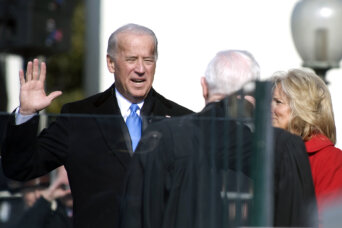- About
- Topics
- Picks
- Audio
- Story
- In-Depth
- Opinion
- News
- Donate
- Signup for our newsletterOur Editors' Best Picks.Send
Read, Debate: Engage.
| topic: | Climate action |
|---|---|
| located: | USA |
| editor: | Yair Oded |
President-elect Joe Biden has campaigned hard on the issue of climate change, vowing to reverse President Trump’s catastrophic environmental policies and wend the US towards a carbon-free economy. Now that he cinched the presidency, Biden’s environmental pledges must be translated into concrete steps. While there is no doubt that the president-elect is taking the issue of climate seriously, many still worry that his approach is not sufficient in order to meet the deadlines to stave off the worst effects of the climate and environmental crises we face.
As he labours to assemble his future cabinet, Biden is selecting individuals with a strong climate advocacy background to top positions. In a rather novel more, Biden is also adopting a horizontal approach to the fight against climate change - ensuring that climate considerations are being taken into account in various agencies and departments. Biden is also in the process of establishing a special White House office or council that will oversee and coordinate climate-related work across government agencies.
In his “Plan for Climate Change and Environmental Justice,” Biden pledges to embark on an accelerated yet just transition to clean energy, focusing on job creation and racial disparities. The Biden team is reportedly already drafting policies that will restrict air, water, and land pollution in Black and Brown communities (which currently face the brunt of industrial pollution).
Crucially, Biden has also pledged to rejoin the Paris Agreement, from which the US officially withdrew earlier this month - a move that would signal to the international community that the US is once again an ally in the fight against climate change. In an interview with the New York Times, Ernest Moniz, a former energy secretary and advisor to the president-elect, stated that, “We have to re-establish American leadership globally on climate change, and re-establishing global leadership is going to require getting our house in order domestically.”
Yes, Biden’s victory comes as a relief to state and city leaders, as well as climate activists, who for years had to grapple with this heaving crisis on their own as the federal government sought to sabotage any shred of progress on the environmental front. Yet, many climate activists are worried that Biden’s plan simply won’t cut it, and that the steps taken by his administration won’t be effective enough in mitigating pollution and sequestering emissions.
Biden’s announcement that he will not ban fracking - an oil and gas drilling method that poses a great risk to ground and surface water, wild landscapes, and wildlife - was a first indication that his environmental approach is flawed. His climate plan’s final draft also omitted the initially-pledged abolition of fossil fuel subsidies and tax breaks.
Furthermore, despite selecting certain cabinet members who are vocal about climate issues, Biden is nonetheless filling his future administration with individuals who are beholden to the fossil fuel industry - one of them being Louisiana Rep. Cedric Richmond, who is slated to lead the Office of Public Engagement and has reportedly received more money from the fossil fuel industry throughout his political career than any other Democrat.
Varshini Prakash, executive director of the Sunrise Movement, told NPR that Richmond’s pick "feels like a betrayal” and “an affront to young people who made President-Elect Biden's victory possible.”
In order to meet the challenges of our time, a Biden administration’s focus cannot be centered merely on climate, and must acknowledge and address the entire ecological collapse precipitated by our civilisation’s actions. This would necessitate an overall reshaping of our economic structure, and a re-examination of our relation to Earth. It would mean not only reinstating environmental protections rescinded under Trump, but expanding the scope of the original policies, recognising that even before Trump our approach wasn’t sufficiently comprehensive. It means significantly capping our extraction practices and rethinking our consumption habits and redesigning our food industry and doing away with our economic models predicated on infinite-growth. It means revolutionising our understanding of work and how we view value.
This isn’t an undertaking any government alone can (or should, for that matter) solve by decree, but a transitional process we need to commit to as a society. That said, our government can certainly stir us in the right direction by both example and action, specifically when it comes to whom it installs in positions of power and what agendas it promotes.
Between his ties to the fossil fuel industry and corporate interests, refusal to ban fracking, and reluctance to truly incorporate progressive voices into his administration, Biden is understandably alarming many climate activists who doubt his ability to muster the courage and political will to take the bold, necessary steps that will protect our planet’s future.
It is important to bear in mind that Biden will, in all likelihood, face a Republican-controlled Senate that will set out to torpedo his climate agenda. And so, in order to pass even remotely sufficient environmental legislation, Biden will have to aim extremely high. He simply cannot afford to act as the moderate he ran as. The planet’s clock is ticking.
